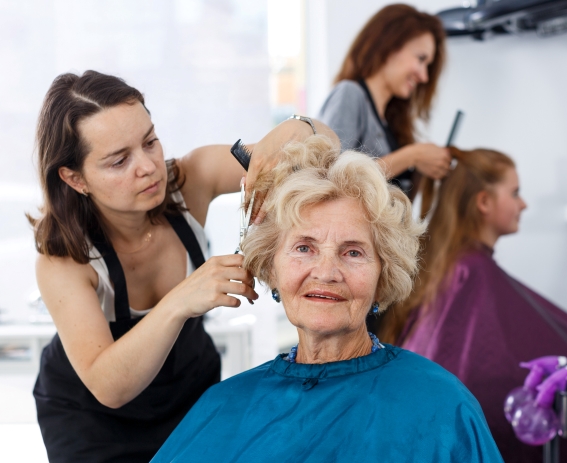As women age, many experience thinning hair, which can be distressing and frustrating. Female pattern hair loss (FPHL) affects approximately 40 percent of women by age 50, making it a common concern among aging women. This condition is often linked to hormonal changes associated with menopause, leading to hair becoming thinner in various areas of the scalp.
At the core, hair is not just a part of our physical appearance but a symbol of our identity and femininity. Women develop a special connection with their hair over time, making it an essential part of their self-expression. Losing hair can be a distressing and emotionally challenging experience for women, especially after menopause. We understand the impact this can have on your self-confidence and image. We’re here to provide practical and effective tips to help you reverse thinning hair after menopause.
Our aim is to help you regain a sense of control and overcome this issue so that you can feel confident and radiant once more. So, let’s look at some solutions to help you win this battle against hair thinning.
Understanding the Causes of Thinning Hair After Menopause
As mentioned above, hormonal imbalance symptoms in women and their side effects are a common cause of hair thinning after menopause. During menopause, the body undergoes a significant drop in estrogen levels, which plays a vital role in hair growth. Estrogen helps to keep hair in the growth phase for a longer time, leading to fuller, healthier hair. A decrease in this hormone can cause hair follicles to shrink, leading to thinning hair and hair loss.
Apart from hormonal changes, other factors can also contribute to hair thinning after menopause. Genetics, stress and poor nutrition are just a few additional factors that play a role in hair loss during menopause. Women with hormonal imbalance symptoms may also experience other issues, such as hot flashes and mood swings. That said, addressing these underlying causes is crucial to reverse thinning hair effectively.
Click Here to Understand Hormonal Imbalance Symptoms in Women
Tips for Reversing Thinning Hair After Menopause
If you’re experiencing hair thinning after menopause, there are a variety of tried-and-tested ways to combat this issue effectively. Here are some tips that can help you reverse hair thinning and restore your hair’s natural beauty:
1. Eat a Nutrient-Dense Diet
Eating a healthy diet rich in vitamins and minerals can go a long way in promoting hair growth. Some foods that are especially beneficial for hair health include leafy greens such as spinach and kale, nuts like almonds and walnuts and fatty fish like salmon and mackerel, all of which are high in vitamin D, iron and omega-3 fatty acids.
2. Take Hair Growth Supplements
In addition to eating healthy foods, taking supplements such as biotin and vitamin D can also promote healthy hair growth. Biotin, in particular, is a B vitamin that can strengthen hair follicles and improve hair thickness.
3. Use Gentle Hair Care Products
Avoid harsh chemicals such as sulfates and alcohol-based products that can damage hair. Instead, use gentle hair care products that are specially formulated for thinning hair. Opt for sulfate-free shampoos and conditioners that contain nourishing natural ingredients and avoid over-washing your hair.
4. Style Hair with Care
Be gentle with your hair when styling it. Use a wide-toothed comb and avoid tight hairstyles that can cause hair breakage. In addition, avoid heat-styling tools such as curling irons and straighteners to reduce damage to your hair.
5. Perform Scalp Massages and Relaxation Techniques
Scalp massages can promote blood flow and stimulate hair growth. Additionally, relaxation techniques such as deep breathing and meditation can help reduce stress, which can also contribute to hair loss.
Click Here to Take Control of Your Hair Loss with Hormone Testing
6. Hormone Replacement Therapy
If you’re experiencing severe hair loss or thinning after menopause, hormone replacement therapy (HRT) could be an option for you. As mentioned before, menopause decreases estrogen production, which affects the hair growth cycle. HRT involves taking medication or supplements containing hormones such as estrogen and progesterone to replace those that the body no longer produces in sufficient amounts. A similar option is bioidentical hormone replacement therapy (BHRT), in which hormones are derived from natural plant sources.
It’s important to consult with your doctor about the benefits of hormone replacement therapy and whether HRT is a suitable option for you. They can assess your medical history and evaluate the potential of HRT to help you. HRT can have benefits beyond treating hair thinning, such as easing hot flashes, night sweats and mood swings, so it’s definitely worth exploring during and post-menopause.
Regain Confidence in Your Hair
Thinning hair doesn’t have to be a lifelong issue. Women can take positive steps to reverse the effects of hair thinning and regain their confidence. By following the tips we’ve suggested, you can encourage healthy hair growth and improve the appearance of your hair.
Speaking with a knowledgeable healthcare provider before trying new supplements or treatments is essential. They can give you personalized advice, help you determine how these tips may work best for your specific hair-thinning concerns and conduct hormone testing to see if HRT may be an option for you.
Remember — you’re not alone in this journey. So take these proactive steps today and you’ll be on your way to achieving fuller, healthier hair.

